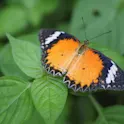
Life sciences
05 Aug 2016
Under-reporting of fisheries catches threatens Caribbean marine life
by Brittany Alexander, Frontiersin.org Marine fisheries catches have been drastically under-reported in the Turks and Caicos Islands in the Caribbean, threatening the marine environment and livelihoods of the local community, reveals a recent study published in the open-access journal Frontiers in Marine Science. Actual catches on the islands were an alarming 2.8 times, or 86% higher than that reported to the FAO, and this has very troubling implications. Lead researcher Aylin Ulman, recently based at the Sea Around Us, and her team call for urgent action from policy-makers to ensure the future sustainability of the fishing industry in this archipelago nation. Fishing has historically been the main industry in the Turks and Caicos Islands and in some areas up to 75% of locals are involved in the fishing industry. The rise in tourism is creating more demand for locally caught seafood and is placing increasing pressure on local marine life. The islands operate small-scale fisheries for queen conch, Caribbean spiny lobster, and finfish as the three main targets. The local government is required to report all catches to the Food and Agricultural Organization (FAO) to be able to trade with signatory nations of CITES (Convention on International Trade in Endangered […]













